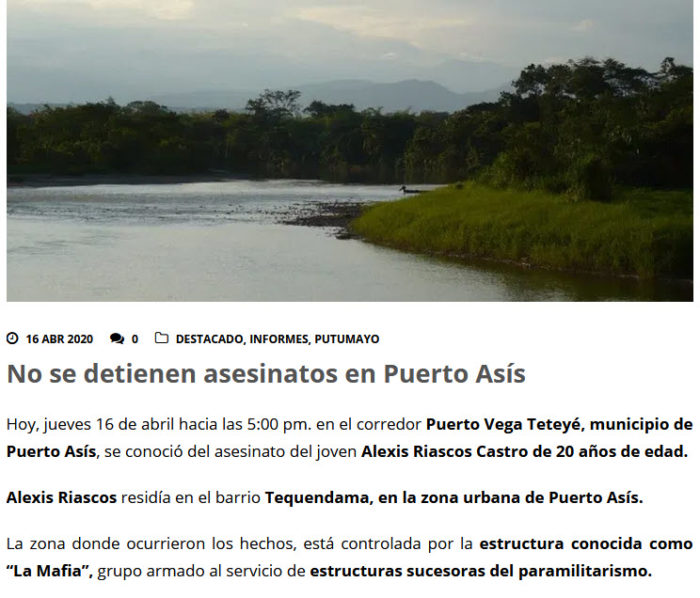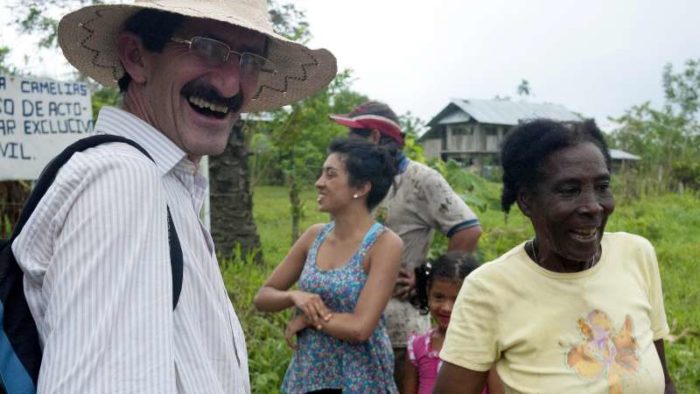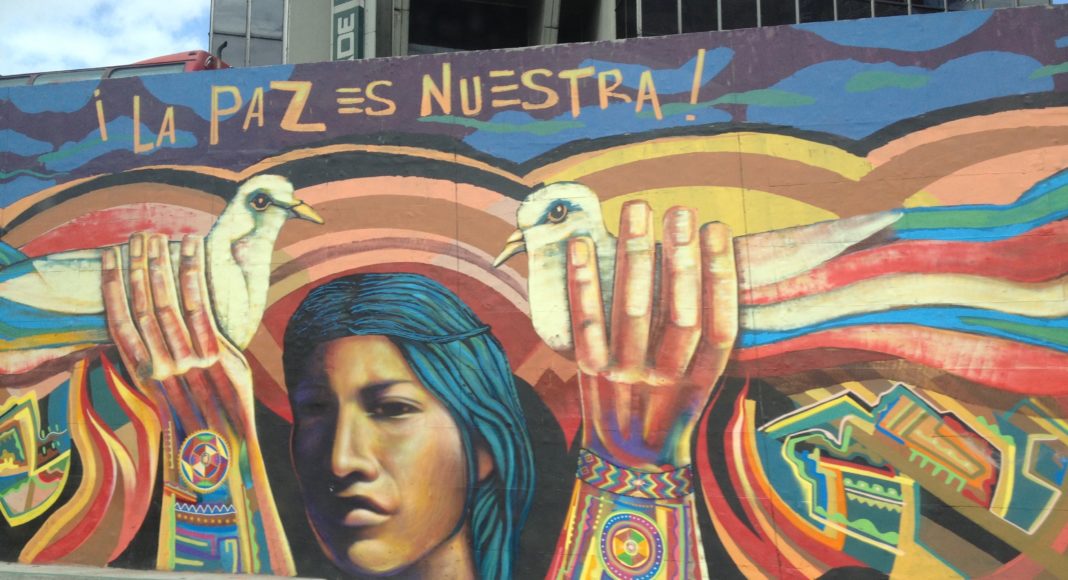Written by Christian Aid’s Kate Newman and Karen Brock, based on conversations with Pedro Lazaro, Thomas Mortensen and Alejandra Albizu.
For more than two decades, Christian Aid and its partners, including the Inter-Church Commission for Justice and Peace (CIJP), have been working to tackle violence and build peace in Colombia. Ten Years, a long-term study of change being undertaken by Christian Aid’s Research, Evidence and Learning team, first begun around three years ago following the signing of a Peace Agreement between the government of Colombia and the Revolutionary Armed Forces of Colombia (FARC).
The first instalment introduced the Ten Years of Change long-term study, whilst the second blog post delved deeper into the involvement of local partner the Inter-Church Commission for Justice and Peace (CIJP) in the project. The third blog post explored how organisations like CIJP have had to adapt and change their theory of change in line with the recent shift towards peace-building at an institutional level in Colombia. The following blog post shares further insights into how the response and adaptation of an international NGO to a shifting context of conflict and peace-building evolves over time.
This is the fourth and final post which reflects on how Christian Aid itself, an international NGO, responded to these challenges.
It is 2017. The peace accord is less than a year old and civil society actors across Colombia are full of hopeful anticipation. The signing of the accord has not ended the violence, but it has enabled discussion of it in the public arena. Once the violence is acknowledged, it can be understood and discussed: Who are the perpetrators? What are the root causes? How are different people affected? Legislation has been passed and spaces are opening up – to publicly share information about the atrocities of the past, to work towards collective healing, to establish processes and institutions for building peace.
This new context brings new opportunities and focus to civil society organisations such as Christian Aid, an international NGO which has undertaken solidarity and human rights defence work in Colombia for over twenty years. This work responded to a context of extreme violence and focused on protecting communities and visibilising violence. With the new peace agreement, such organisations could begin to think about their role in Colombia and adjust their work to the new possibilities.
Travel forward two years to the end of 2019, and the picture that has emerged is not what was hoped for. The nascent peace took a strong hit in 2018 when the country elected a right-wing president from the party which had initially tried to block the peace agreement. Investment in the institutions of peace has been low, and the pace of change slow – in some areas, the process has been showing no signs of real progress, and in some cases has been heading backwards. Levels of violence in some areas of the country are unchanged, or even higher.
During this period (2017-19), as part of their Ten Years of Change study, the Research, Evidence, and Learning team of Christian Aid engaged Christian Aid Colombia’s staff in three annual focus group discussions. They reflected on the realities of each moment, and how that context at that time was shaping Christian Aid’s engagement in the process of building peace. This blog shares insights into how the response and adaptation of an international NGO to a shifting context of conflict and peace-building evolves over time.
Adjustment: from the possibilities of peace, to protection of the peace process
In October 2017, Christian Aid Colombia staff were optimistic about the possibilities for peace; they were discussing how to gradually shift their work programme from protection of communities and rights defenders to supporting the return of people to their land:
If there is more peace, we can do more work on markets and productive projects … [to] allow displaced communities to recover the welfare they had before the violence arrived.
Rights defence work had happened at many levels – from maintaining the public visibility of rights defenders, to helping to bring rights abuse cases to national, regional and international courts. Although this work was challenging and dangerous, after many years of experience, Christian Aid was very familiar with the systems and processes needed to do it.
By contrast, development for peace-building was proving complex to define. The move from ‘standing in solidarity’ to ‘implementing a programme’ meant different activities, funding, management and relationships – and a focus on livelihoods and markets that was new to Christian Aid Colombia. Moreover, new programming strategies also needed to respond to the context of building peace. The staff in Colombia were considering how they could translate Christian Aid’s core values of gender, climate and economic justice and give them meaning in a peace-building context.
A year on, in 2018, the context had shifted yet again. The newly-elected conservative government was challenging the peace agreement:
They have not thrown the peace accord away, but they are weakening it, ignoring it and under-financing it.
This demanded another change in focus, to work out how best to sustain political pressure for implementation of the peace accord, and to ensure funding of and investment in the institutions of peace. The balance between implementing a development programme and engaging in and influencing national debate was once again altering.
By our third conversation, at the end of 2019, the focus was on the violence that was once again increasing. While previous conversations had been relatively upbeat and positive, staff were now dealing with regular reporting of numerous murders of human rights defenders. New actors with both business and political reasons to oppose the peace were emerging. The response to this from Christian Aid staff was a return to focusing on the peace process itself, as well as the fight against impunity, gender-based violence and the protection of human rights defenders. Staff were asking:
It’s another peace process that doesn’t address the root causes – is it just reconfiguration of the conflict?

Thus, by the end of 2019 Christian Aid Colombia had withdrawn from its work on inclusive market development due to both the shifting context and the challenges in moving to a programme implementation approach.

Dilemmas in adapting to attempted peacebuilding
Based on three years of reflections, some broad areas have presented particular dilemmas for adapting the programme:
Changing understanding of peacebuilding and justice: While in 2017 there was a focus on building peace through reintegrating returning communities and developing alternative livelihoods, the 2018 conversation noted that ongoing violence and threats against human rights defenders forced a focus on political and civil rights over economic and social rights. An undercurrent common to the three conversations was the need to widen the way that peacebuilding and justice are understood. Each year, the team reflected on how to adapt peacebuilding and rights defence to include climate, environment, identity and different dimensions of inequality – as well as adapting them in response to the shifts in implementation of the peace agreement.
Changing nature of violence and protection: In 2017, it seemed possible to hope that people would not be killed because of their political ideas, and that community leaders would be able to shift their focus from security to livelihoods. But this was completely reversed by 2018, with leaders being explicitly targeted for pressing for the implementation of the accord. At the same time, partners working to protect those vulnerable to violence had to grapple with changes in legislation brought about by the peace agreement: if Colombia was no longer officially a conflict zone then international humanitarian law – previously used extensively for protection and advocacy work – no longer applied in the same way.
Old actors, new discourses: When the peace accord was signed, it re-defined key political actors. The FARC were no longer insurgents, but a political group; and the military begun to consider how to redefine its role nationally as having a role in poverty reduction, and internationally as a force within NATO, to keep its budget and its power. Within these changing identities, Christian Aid had to navigate new relationships, always maintaining an identity as an independent civil society voice, with a focus on protecting and maintaining space for its partners. Also important was the rise of social unrest, with students, workers and indigenous communities raising their voices – protesting the lack of progress on peace, as well as corruption. Progressive forces were becoming more united, and in the face of a shrinking space for peace, staff were identifying ‘the need to become more political, and take sides’.
Adding value amidst complexity and change
What can we learn from these conversations to deepen understanding of the role of an INGO in a peacebuilding context? They suggest that potential lies in amplifying voice, connecting diverse actors and collaborating to adapt new concepts to shifting realities.
Across all three conversations, constant reference is made to the power of visibility and international interest in continuing to push for peace in Colombia from the outside:
The international community is pushing the peace agreement in the country – it is still very aware and very focused on Colombia … If it wasn’t for that pressure, the government wouldn’t have a peace agenda.
Such reflections signalled the need for Christian Aid to ensure that current realities are communicated and shared internationally – including through Ten Years of Change. But equally important is ensuring that Christian Aid’s CSO partners continue to engage in international policy processes like the UN’s 2018 Universal Periodic Review of Colombia’s human rights record.
Relationships with new actors have also become important, for example through international research partnerships. The credibility conferred by Christian Aid Colombia’s involvement in Drugs and (dis)Order, a consortium of international researchers, strengthened its reputation as a knowledgeable authority on illicit economies and peacebuilding and quickly deepened its relatively new relationships with academics:
We mutually support each other politically – we have access to areas and people that they don’t have. They develop evidence for our narrative that we don’t have.
This credibility, together with a sense of political neutrality lent by a partnership with internationally renowned researchers, has opened new opportunities to become engaged in policy spaces that were formerly closed. For example, Christian Aid Colombia has spoken out on crop substitution, using evidence from research to expose the lack of implementation of the peace agreement in this area, challenge orthodox drug policy, and argue for alternative approaches.
Strategic changes in Christian Aid internationally also influenced the direction taken in Colombia. For example, discussions on social and economic rights encouraged staff in Colombia to use their engagement in the peace process to focus on the right to land, while discussions of climate justice have encouraged a vision of living in harmony with nature and using land for sustainable livelihoods. In some ways, such thinking has enabled Christian Aid to come full circle – using the space offered by the peace process to revisit inclusive markets work with a focus on justice rather than programme implementation.
Finally, although the context of violence was clearly challenging in December 2019, there was also cause for ongoing optimism:
Civil society is changing, there is a broad mobilisation of people, discontent with how things are now, and people expressing their unhappiness. But there is also a strong rejection of violence and an awareness that violence will undermine demands. We need to capitalise on this trend.
Main image: Street Art Bogota, Colombia (Juan Cristobal Zulueta)


